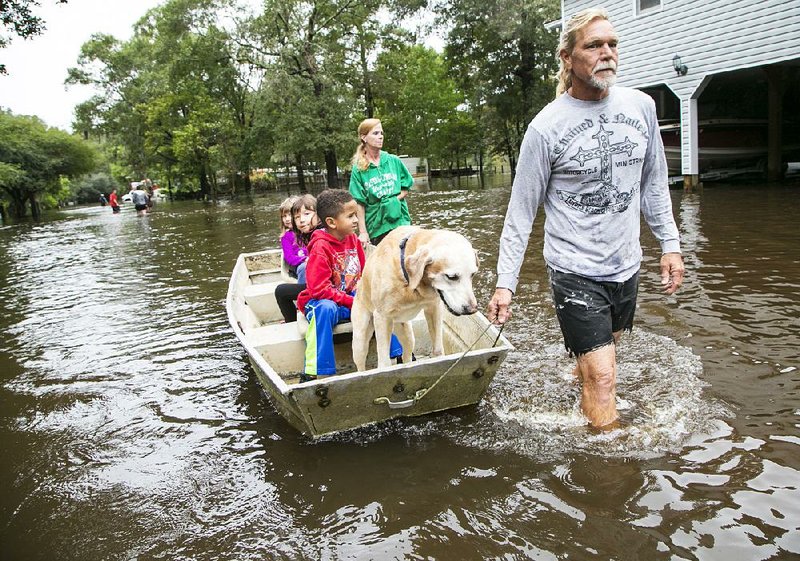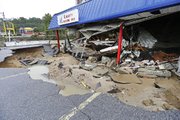COLUMBIA, S.C. -- After a week of steady rain, the showers tapered off Monday and an inundated South Carolina turned to surveying a road system shredded by historic flooding, and thousands of residents faced the prospect of going days without running water.
29781107
The governor warned communities downstream, near the low-lying coast, that they may still see rising water and told residents to be prepared for more evacuations. More than 900 people were staying in shelters and nearly 40,000 people were without water.
At least 12 weather-related deaths in two states were blamed on the rainstorm. One of the latest to die was McArthur Woods, 56, who drove around a barricade and drowned Sunday night. His passenger managed to climb on top of the sedan, which stalled in the rushing water. A firefighter rescued her after someone heard her screams.
"She came out the window. How she got on top of the car and stayed there like she did with that water -- there's a good Lord," Kershaw County Coroner David West said.
On Monday, the rains moved north into North Carolina and the mid-Atlantic states. The storm was part of a system that dumped an unprecedented amount of rain across South Carolina and several other states. Satellite images released by the National Oceanic and Atmospheric Administration show South Carolina getting drenched by a "fire hose" of tropical moisture.
Sunday was the wettest day in the history of South Carolina's capital city Columbia, according to the National Weather Service.
The 16.6 inches of rain that fell on Gills Creek near downtown Columbia on Sunday marked one of the rainiest days in the U.S. in the past 15 years, according to weather stations with more than 50 years of record-keeping. There was so much rain in Gills Creek that a water gauge was swept off a bridge and had to be replaced by members of the U.S. Geological Survey.
"The flooding is unprecedented and historical," said Marshall Shepherd, a meteorologist and director of the atmospheric sciences program at the University of Georgia.
He said the unique double punch of the upper-level low -- aided by a "river" of tropical moisture in the atmosphere from Hurricane Joaquin spinning far out in the Atlantic -- gave the rainstorm its punch.
South Carolina Gov. Nikki Haley has said the deluge is the kind of storm seen only once in 1,000 years.
On Monday, she said 550 roads and bridges were closed across the state. All will have to be checked for structural integrity, which could take weeks or longer.
She said floodwaters will continue to rise in some areas as rainwater runs toward the coast.
"This is not over. Just because the rain stops does not mean that we are out of the woods," Haley said at a news conference.
Haley, a Republican, also thanked President Barack Obama for a disaster declaration that frees up federal resources and for personally calling her Monday morning.
Shortly after the governor's news conference, two dams in two separate towns east of downtown Columbia burst on Monday afternoon, forcing the evacuation of some neighborhoods.
James Shirer, who lives in the area, saw one of the dams, in the town of Forest Acres, fail and a 22-acre lake drain in 10 to 15 minutes.
"It just poured out," Shirer said.
Ten people have died in South Carolina since the storm started. Two additional weather-related deaths were reported in North Carolina.
At least three people were killed Sunday in South Carolina, including a transportation worker who died overseeing work near downtown Columbia, a woman who was swept away in her SUV and the man who drove around the barricade Sunday night in the Lugoff community northeast of Columbia, the coroner said.
Haley said that 25 emergency shelters are open, housing more than 900 people. Utility crews, meanwhile, were working to restore power to 26,000 people, she said.
The flooding forced hundreds of weekend rescues and threatened the drinking water supply for Columbia, with officials warning that some could be without potable water for days because of water main breaks. The capital city told all 375,000 of its water customers to boil water before drinking.
Officials brought in bottled water and portable restrooms for the 31,000 students at the University of South Carolina, and firefighters used a half-dozen trucks and pumps to ferry hundreds of thousands of gallons of water to Palmetto Health Baptist Hospital.
Capt. Isaac Romey of the Columbia Fire Department said "the tankers pull the water out of the hydrants, move it into dump tanks and then pull it into the hospital." The water was not for consumption.
Many schools and colleges, including the university, canceled classes Monday and today, and some businesses planned to stay shuttered. State climatologists have said the sun could peek out today.
Information for this article was contributed by Bruce Smith, Mitch Weiss, Susanne M. Schafer, Jonathan Drew, Meg Kinnard and Seth Borenstein of The Associated Press.
A Section on 10/06/2015


